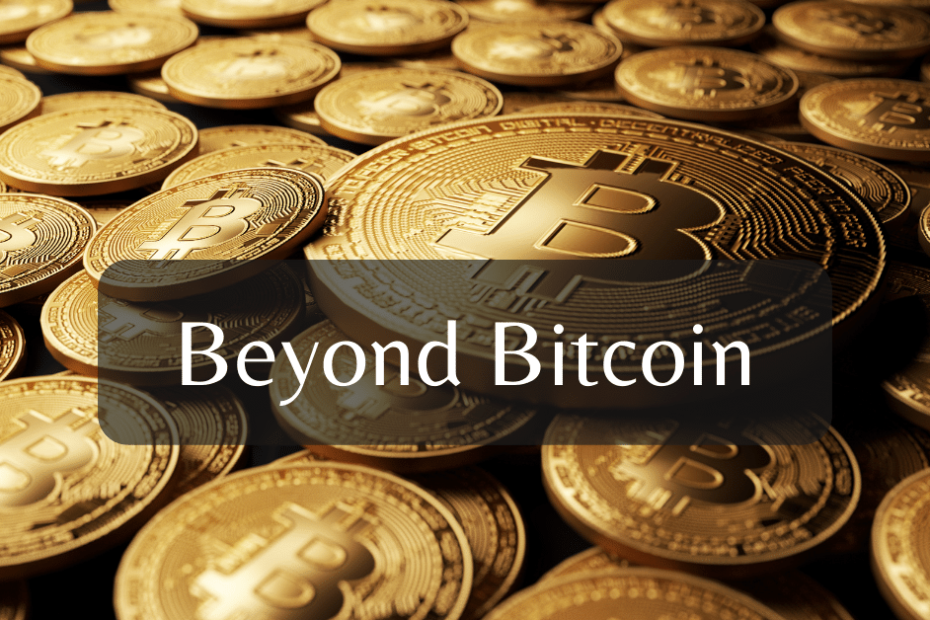Blockchain technology, initially designed for Bitcoin, has grown to become a bedrock of digital innovation far beyond its origins. It emerged as a distributed ledger, known for its robust security, transparency, and decentralization. Bitcoin, its first application, showcased blockchain as a groundbreaking approach to digital currency, challenging traditional financial systems.
The potential of blockchain extends significantly beyond cryptocurrency. This technology is paving the way for innovative solutions across various sectors, leveraging its tamper-proof records and decentralized consensus mechanisms to address numerous industry challenges.
Blockchain’s future applications are as varied as they are influential. It’s not just transforming financial transactions; it’s revolutionizing entire industries like supply chain management and healthcare. This article will explore the evolution of blockchain and how it’s shaping the world beyond Bitcoin.
The Evolution of Blockchain: From Bitcoin to a Multitude of Uses
The Dawn of Blockchain with Bitcoin
Blockchain began its journey with the creation of Bitcoin in 2009 by the mysterious Satoshi Nakamoto. Bitcoin introduced blockchain as a transparent and public ledger for all transactions, solving the double-spending problem without needing a central authority.
Early Signs of Broader Utility
As Bitcoin’s popularity soared, the technology underpinning it, blockchain, began to showcase its broader potential. Innovators recognized that blockchain’s principles could be applied in various contexts, heralding a new era of technological applications.
Key Technological Attributes Fueling Versatility
Blockchain’s versatility comes from its unique characteristics. It’s decentralized, eliminating single points of failure and control. Its immutability ensures that once data is recorded, it cannot be altered retrospectively. Blockchain is transparent, offering open access to transaction histories while maintaining privacy. Its security, grounded in cryptographic hashing and consensus algorithms, safeguards data integrity.
How Blockchain is Transforming Industries: A Comprehensive Overview
Finance and Banking: Beyond Cryptocurrencies, Embracing Smart Contracts
In finance, blockchain transcends cryptocurrencies to include applications like smart contracts, which are self-executing contracts with the terms directly written into code. Platforms like Ethereum have popularized smart contracts, enabling decentralized applications that operate autonomously. These applications are reshaping finance, allowing users to lend, borrow, and earn interest on cryptocurrency without intermediaries.
Supply Chain Management: Enhancing Transparency and Efficiency
Blockchain dramatically impacts supply chain management by enabling real-time tracking of goods and verification of events. This technology is used by major corporations to track produce from the farm to the store, reducing the time to trace products and improving safety measures during recalls.
Healthcare: Securing Patient Data and Pharmaceutical Tracking
Blockchain in healthcare offers secure management of patient records, ensuring privacy and integrity. It’s also being used by pharmaceutical companies for tracking drug movements, combating counterfeit medications. This technology creates tamper-proof records for drug shipments, enhancing safety and reliability.
Real Estate: Streamlining Property Transactions
In the real estate sector, blockchain simplifies processes like property searches, verifications, and title management. Governments and authorities are experimenting with blockchain for property transactions, reducing time for contract signings and ownership changes.
The Future of Blockchain Technology
Expert Opinions on Blockchain’s Potential
The potential of blockchain technology extends well beyond its current applications. Industry experts and thought leaders concur that blockchain is not just a fleeting trend but a fundamental technology poised to revolutionize various sectors. They highlight its potential to enhance data security, increase transparency, and create new business models. Experts predict blockchain will play a crucial role in the future of industries like finance, healthcare, logistics, and even governance, leading to more efficient, secure, and transparent systems.
Emerging Trends in Blockchain Technology
Several emerging trends are shaping the future of blockchain. One significant trend is the rise of decentralized finance (DeFi), which is disrupting traditional banking by offering more accessible financial services. Another trend is the integration of blockchain with other cutting-edge technologies like the Internet of Things (IoT) and Artificial Intelligence (AI), creating more sophisticated and automated systems. Additionally, the concept of non-fungible tokens (NFTs) is gaining traction, offering new ways to monetize digital assets and opening up avenues in art, music, and entertainment.
Ethical Considerations and Potential Challenges
While blockchain presents numerous opportunities, it also raises ethical and operational challenges. Privacy concerns, especially in public blockchains, are a significant issue, as is the environmental impact of some blockchain implementations, notably those that require extensive computing power. Additionally, the decentralized nature of blockchain poses governance challenges, as there is no central authority to oversee operations. Navigating these challenges requires a balanced approach, considering the technology’s benefits against its potential drawbacks.
Integrating Blockchain into Your Business
Identifying Opportunities for Blockchain Implementation
The first step in integrating blockchain into a business is identifying areas where its features can solve existing problems or create new opportunities. Businesses should look for processes that require high levels of trust, transparency, and security. Examples include supply chain management, data storage, and financial transactions. By pinpointing these areas, businesses can focus their efforts where blockchain will have the most significant impact.
Steps for Integrating Blockchain Technology
Once opportunities are identified, the next steps involve planning and implementation. This process typically includes:
Understanding Blockchain: Gaining a thorough understanding of blockchain technology and how it applies to your business.
Choosing the Right Platform: Selecting a blockchain platform that suits your business needs, whether it’s a public, private, or consortium blockchain.
Developing a Proof of Concept: Creating a small-scale implementation to test the feasibility and effectiveness of the blockchain solution.
Partnering with Experts: Collaborating with blockchain experts or consultants to guide the development and implementation process.
Integration and Testing: Integrating the blockchain solution into existing business processes and conducting thorough testing to ensure reliability and efficiency.
Overcoming Common Challenges and Misconceptions
Businesses often face challenges and misconceptions when adopting blockchain technology. These include the belief that blockchain is only about cryptocurrencies, concerns about the technology’s complexity, and uncertainties about regulatory compliance. Overcoming these challenges involves educating stakeholders about blockchain’s broader applications, seeking expert assistance to navigate its complexities, and staying informed about regulatory changes and compliance requirements.
Blockchain Beyond 2023: Predictions and Innovations
Upcoming Innovations in Blockchain Technology
As we move beyond 2023, blockchain technology is poised for further innovation. Advances in scalability and speed are expected, making blockchain more practical for high-volume applications. Interoperability between different blockchain systems will likely improve, facilitating a more connected and efficient blockchain ecosystem. Innovations in consensus mechanisms are anticipated to reduce energy consumption, addressing environmental concerns. Additionally, the development of more user-friendly blockchain platforms is expected, making the technology accessible to a broader audience.
Predictions for Blockchain’s Role in Various Sectors
Blockchain is set to play a pivotal role across various sectors. In finance, it will likely continue to disrupt traditional banking, with DeFi becoming more mainstream. The healthcare industry may see widespread adoption of blockchain for secure patient data management and drug traceability. Supply chain transparency and efficiency will be significantly enhanced by blockchain solutions. Moreover, blockchain could play a crucial role in ensuring data integrity in the era of big data and IoT.
The Role of Regulatory Frameworks and Global Adoption
The global adoption of blockchain will be influenced significantly by regulatory frameworks. Governments and regulatory bodies are expected to develop clearer guidelines and standards for blockchain applications, particularly in finance, data security, and privacy. International cooperation might emerge for setting global standards, facilitating cross-border blockchain applications. The evolution of these frameworks will be crucial in shaping the trajectory of blockchain adoption worldwide.
Blockchain Applications and Trends in 2023

Diverse Applications of Blockchain
The first graph provides a visual representation of the various applications of blockchain technology in 2023. It highlights the significant roles blockchain plays in sectors like Money Transfer, Smart Contracts, IoT, Healthcare, and Logistics. This diversity showcases the technology’s adaptability and its ability to offer innovative solutions across different industries.
Key Trends Shaping Blockchain
The second graph focuses on the major trends influencing blockchain technology in 2023, including the growth of Decentralized Finance (DeFi), the impact of fraud and corruption, legal crackdowns, enterprise investments, and the integration of NFTs in business. These trends indicate a dynamic blockchain environment, evolving with both challenges and advancements.
Frequently Asked Questions (FAQs)
Is blockchain technology limited to financial applications like cryptocurrencies?
No, blockchain technology extends far beyond cryptocurrencies. Its applications are diverse, including supply chain management, healthcare data management, digital identity verification, and real estate transactions. The secure, transparent, and decentralized nature of blockchain makes it suitable for a wide range of industries.
How does blockchain contribute to data security?
Blockchain enhances data security through its structure. Each block of data is encrypted and linked to the previous block, forming a chain. This linkage means altering any single record would require changing the entire chain, which is computationally impractical. Additionally, its decentralized nature prevents single points of failure, making it robust against attacks and fraud.
Can blockchain technology be environmentally friendly?
While traditional blockchain models, particularly those in cryptocurrencies, can be energy-intensive, newer blockchain systems are adopting more energy-efficient approaches like proof-of-stake. These advancements significantly reduce the environmental impact of blockchain technology, making it more sustainable.
What role does blockchain play in supply chain management?
In supply chain management, blockchain provides transparency and traceability. It allows for real-time tracking of products from origin to consumer, ensuring the authenticity of goods and improving efficiency. This transparency helps in reducing fraud, managing recalls more effectively, and increasing consumer trust in products.
In conclusion
As we delve into the transformative potential of blockchain, it’s clear that this technology is more than just the backbone of cryptocurrencies. Its implications span numerous industries, offering unprecedented levels of transparency, security, and efficiency. Embracing blockchain innovations requires not only technological readiness but also a shift in mindset towards decentralized and transparent systems. The continued evolution and adoption of blockchain will undoubtedly shape the future of digital interactions and transactions, paving the way for a more interconnected and trustworthy digital world.

Eric Dalius is The Executive Chairman of MuzicSwipe, a music and content discovery platform designed to maximize artist discovery and optimize fan relationships. He also hosts the weekly podcast “FULLSPEED,” showcasing conversations with trailblazing entrepreneurs from various fields. Through the “Eric Dalius Foundation,” Eric has created four scholarships for US students. Connect with Eric on Twitter, Facebook, LinkedIn, Instagram, and Entrepreneur.com.

